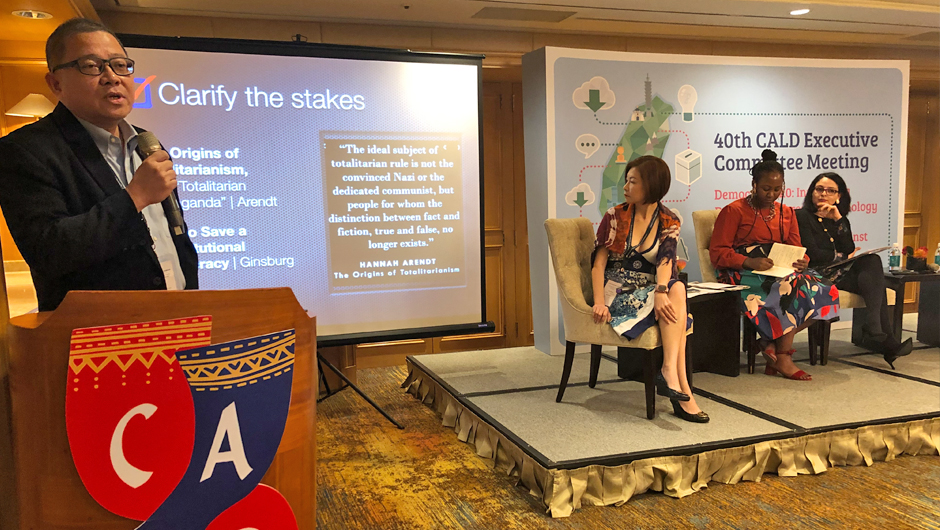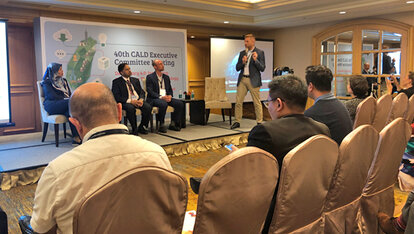Fighting fake news does not depend on government

Philippine Daily Inquirer columnist John Nery, author of Democratic Decay & Disinformation in the Digital Age
Media representatives, think tanks, civil society organizations, and even politicians share the same notion: Governments cannot be the arbiters of truth.
In a workshop on disinformation in Taipei, Taiwan on 21 October 2019, the participants called for a review of existing “anti-fake news” laws, and more support for media literacy programs.
“Since the introduction of internet in Southeast Asia in 1995, incumbent regimes have used legislation to negate the democratic potential of the internet. Fake News Laws are latest installment since 2017,” said Robin Ramcharan, Executive Director of Asia Centre, a non-profit organization that looks at pressing issues in Southeast Asia. “Government representatives in the region seem focused on discrediting or wrongfooting critics,” he added.
While existing laws can be effective in terms of addressing the intentional infliction of emotional distress, invasion of privacy, defamation or libel and slander, cyber-bullying, fraud and copyright infringements, according to Ramcharan “most of these are vaguely-worded laws leading to over-criminalization.” “They don’t necessarily detoxify the post-truth ecosystem, but monopolize coercive action,” he concluded.
Ramcharan cited Singapore’s recently passed Protection from Online Falsehoods and Manipulation Act where anyone who makes available a false statement of fact can be punished.
“We need to create a plurality of institutions of truth,” remarked Philippine Daily Inquirer columnist John Nery. "Education is likely to be the best avenue where citizens including school children are taught better critical-thinking skills,” commented Zachary Lampbell, Legal Advisor at the International Centre for Non-Profit Law in the United States.

LI Former Secretary-General Emil Kirjas highlights freedom of speech as a key liberal principle
Defending freedom of expression
The discussion centered on respecting international standards for the freedom of expression.
Article 19 of the Universal Declaration of Human Rights, adopted in 1948, states that: Everyone has the right to freedom of opinion and expression; this right includes freedom to hold opinions without interference and to seek, receive and impart information and ideas through any media and regardless of frontiers.
The liberal position on the issue of disinformation is also clear on the Liberal International (LI) Andorra Manifesto 2017: Freedom of expression is critical for a liberal democracy. We support unencumbered access to, and circulation of, information for all citizens, and freedom of discourse unhindered by the state and protected by a framework of rules that promote freedom.
International standards for freedom of expression must be respected.
Fake news has always existed
“Disinformation is old news. It has been in use ever since humans discovered the power of the lie,” pointed out Nery who also published a book on Democratic Decay and Disinformation in the Digital Age. “Today, fake news is often described or understood as digital. An Asian perspective can help underline the role digital disinformation plays in hastening democratic decay,” wrote Nery in his book.
Seven of the 20 countries with the fastest growth in absolute number of Internet users, in We Are Social’s January 2019 report, are in Asia. India leads the world with an additional 97.8 million users; three members of the Association of Southeast Asian Nations added over 30 million in one year (Indonesia, plus 17.3 million; the Philippines, plus 9 million; Cambodia, plus 4.5 million). China is second fastest in the world, with an additional 50.6 million users.
“The difference now is amplification and speed. If we try to stop fake news, we will not succeed. We need to frame the issue to identification and limit spread,” said Lampbell.
The workshop was co-organized by the Council of Asian Liberals and Democrats (CALD), Friedrich Naumann Foundation for Freedom (FNF), National Democratic Institute (NDI), and hosted by the Democratic Progressive Party (DPP) of Taiwan.